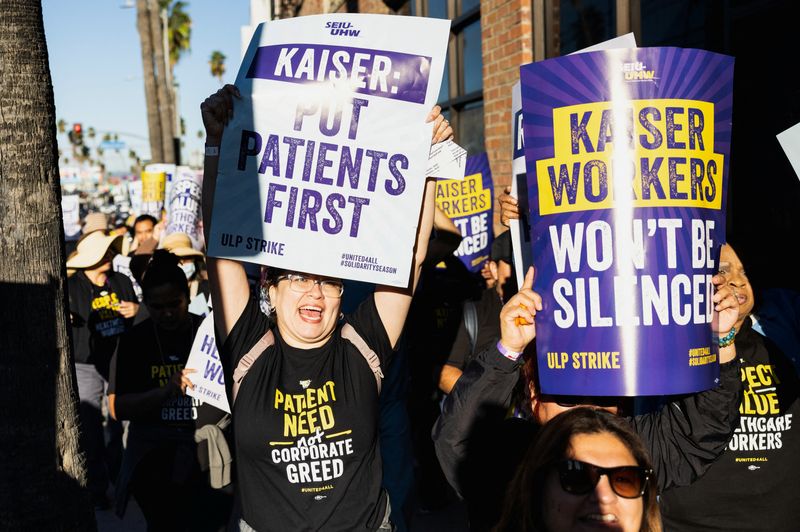By Ahmed Aboulenein and Steve Gorman
WASHINGTON (Reuters) -Kaiser Permanente and union negotiators for 75,000 striking medical workers suspended a marathon round of contract talks without a settlement on Wednesday, the two sides said, hours after the largest such walkout ever in the U.S. healthcare sector commenced.
Kaiser said in a statement released late in the day that tentative agreements had been reached on a number of unspecified issues and that the company would "coordinate" with union leaders to "reconvene bargaining as soon as possible."
But a separate union statement said its team was "awaiting a meaningful response from Kaiser executives regarding some of our priorities," including demands for higher pay and increased hiring to address what union officials called crisis-level staffing shortages.
No further talks have been scheduled as yet, the union said, adding that the strike remained in effect.
Word of the stalemate came roughly 10 hours into a planned three-day walkout by more than 75,000 employees that began at 6 a.m. (1300 GMT) Wednesday, the deadline union leaders had set for achieving an agreement that would have averted a strike.
The largest number of workers previously involved in a major work stoppage of the healthcare sector was 53,000 in 2018, according to the U.S. Bureau of Labor Statistics,
Those taking to picket lines on Wednesday were nurses, medical technicians and other support staff at dozens of Kaiser hospitals and clinics in California, Oregon, Washington, Colorado, Virginia and the District Columbia. Kaiser said its hospitals and emergency departments remained open, staffed by doctors, managers and "contingency workers."
The break-off in talks capped a round-the-clock bargaining session that began on Tuesday and ran through much of the day on Wednesday - the latest round of talks after six months of negotiations. The workers' previous four-year labor pact expired on Sept. 30.
The union coalition says the company, one of the nation's leading not-for-profit healthcare networks and managed-care organizations, has failed to address a prolonged staffing crunch that has left employees feeling overworked and underpaid while compromising patient care.
The company has acknowledged staffing shortages plaguing the entire healthcare sector, a consequence of occupational "burnout" from the COVID-19 pandemic, leading to more than 5 million medical workers leaving their jobs.
The union said its demand for higher pay was another point of contention. The company says it leads competitors in total compensation in every market where Kaiser operates and has offered wage hikes of 12.5% to 16% over four years.
"Kaiser executives can end this strike today if they would just bargain in good faith with frontline healthcare workers," Christina Andersen, a phlebotomist for 12 years at a Kaiser clinic in Claremont, California, said earlier in the day.
Labor unions across the United States have grown bolder in their demands in the last two years, pressing for higher wages and better benefits to combat their loss of spending power due to inflation, and the healthcare sector has emerged in the forefront of that trend.
Nurses and other medical workers at 11 Tenet Healthcare (NYSE:THC) facilities across California recently voted to authorize a strike later this month to spur negotiations with wages and staffing also at issue. They are represented by the SEIU United Healthcare Workers West.
A separate three-day strike has been threatened in two weeks by an SEIU local representing 350 nursing home workers at four Los Angeles-area Brius Healthcare facilities, which union officials say are plagued by dangerously low staffing levels.
Government data shows 2023 is already the busiest year for strikes overall since 2019, and that could grow in coming days if hospitality workers in Las Vegas elect to take action against casinos, and if auto workers escalate their ongoing strike against Detroit's big three automakers.
"For the health industry in particular, I think this signifies the unions' resolve to get proper staffing," said Michael LeRoy, a labor law professor at the University of Illinois Urbana-Champaign. "The reality is that we're in a new era of higher strike activity."
The Kaiser labor coalition, made up of eight unions representing medical professionals and support staff, insists the company needs to hire 10,000 new healthcare workers to fill current vacancies.
In Virginia and Washington, D.C., only optometrists and pharmacists are on strike. The impact on patients in California, Colorado, Oregon, and part of southwestern Washington state would be greater, a Kaiser spokeswoman had said on Tuesday.

Kaiser nationwide employs 68,000 nurses and 213,000 technicians, clerical workers, and administrative staff, alongside its 24,000 doctors.
Nearly 309,700 workers have been involved in work stoppages through August this year, according to U.S. Bureau of Labor Statistics data.
